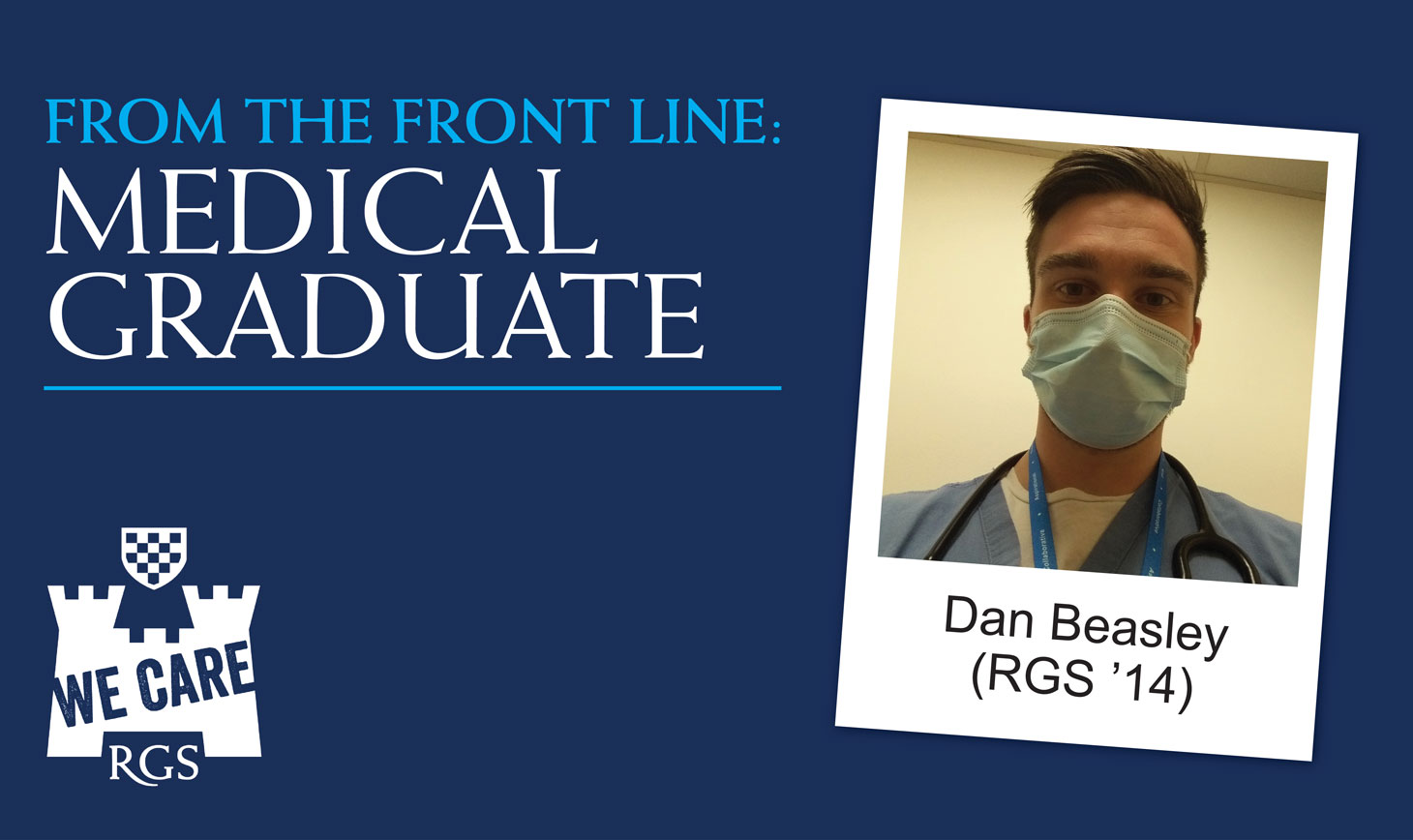
From the front line: medical graduate
We were delighted to hear from Dan Beasley (RGS ’14), a former bursary recipient and recent medical graduate, whose career as a Doctor has started rather sooner than planned.
“Due to the current COVID-19 pandemic, I had the privilege of starting working as a doctor earlier than expected. When I left Reigate Grammar School in 2014 to start medical school, I did not predict this is how I would qualify as a doctor. Having completed my medical school finals on an iPad in my bedroom, I was granted early provision registration as a doctor and graduated from Imperial College School of Medicine in early April.
Right now I was supposed to be undertaking a medical elective in Uganda, as the final stage of my medical school training. However, given the current situation this was of course not to be (a microscopic disappointment relative to what some people have lost during this pandemic). Instead, I have been lucky enough to start work early as an interim Foundation Year Doctor at St Mary’s Hospital in London.
When we arrived on our first day, whilst we received warnings of the safety risks and potential stress of working in hospitals at this time, we were also reminded of how fortunate we are to have this opportunity. Not just because we are able to go into work and earn a wage, for which I count myself lucky, but also because of the numbers of staff currently in hospitals. We have had an introduction into the profession at a time when there is more support from colleagues than under normal circumstances.
For now, the burden of COVID-19 infections in hospitals has peaked and we are beginning to see the psychosocial side-effects of the virus. Within the Hepatology team, in which I have been placed, we are seeing more admissions of patients with chronic diseases, progressing to a severity they would not normally allow. Whether this be due to obstacles in accessing medication, unavailability of GP appointments or social restrictions acting as a deterrent from seeking medical help, those attending hospital are particularly sick. As many people understandably struggle to manage life amidst uncertainty and unfamiliar social restrictions, behaviours such as alcohol consumption and the burden on individuals’ mental health have increased.
Meanwhile, I have come across patients receiving a new diagnosis of treatable cancer who are not able to access essential elective surgery to remove it, given the redistribution of staff within hospitals to manage the influx of COVID-19 patients. The loss some people have had to endure, often without the freedom to see those closest to them for comfort, is unthinkable. Everybody is acutely aware of how far-reaching the consequences of this pandemic are for people’s health, beyond the infection itself.
There have, however, been some positive side-effects. As I was reminded on my first day, this is an unusual and unique time to be working in the NHS. Several of my new colleagues have told me the camaraderie between every member of staff in the hospital is greater now than ever. The UK has witnessed some unprecedented demonstrations of gratitude for the NHS and what it stands for. As one of the largest employers with staff from all over the world, it is something we can all be proud of and grateful for, whether as a patient or an employee.
Whether or not you agree with the war metaphors which have been used the context of this pandemic, nobody has been conscripted into these roles. We have all trained with the intention of this becoming our career. Amidst the outpouring of generosity for NHS workers, we must not forget those people who needed more support before the pandemic began (arguably more support than NHS workers) who need even more now. For example, people without job security, people without housing and those who are now locked in unsafe homes. The collective responsibility to help others and keep them safe is not unique to healthcare workers. Nobody is excluded from the duty to respect social distancing measures and look out for each other. It has never been more obvious that we are much better off when we take a moment to stop, think of how we affect others and help them out.
I was interested to read about the new NHS Scholars initiative at RGS. It is good to hear of a fresh incentive for new people to consider a place at RGS, who may have thought it beyond their means before. I hope the new scholarship helps those parents and pupils who need it most. Whilst a doctor can earn a perfectly healthy salary working in the NHS, others in the workforce, such as nurses, are still paid disproportionately little for the incredible work they do. I received an assisted place and Peter Harrison scholarship and certainly would not have been able to attend RGS without this support.
It will take a while before I can say that my efforts in this job have had any significant or long-lasting impact on patients, but for now I will strive to learn from the healthcare professionals around me, who I am honoured to call colleagues. People are very concerned about what ‘normal’ will be in the near future. I hope the heightened ethos of support, generosity and gratitude for each other which we have seen manifest from this pandemic becomes a new norm once this is all over.”
You might also be interested in…
See our amazing Reigatians in action – celebrating the dedication of Reigatians working on the front line
From the front line: GP surgery
From the front line: hospital ICU
From the front line: care homes
